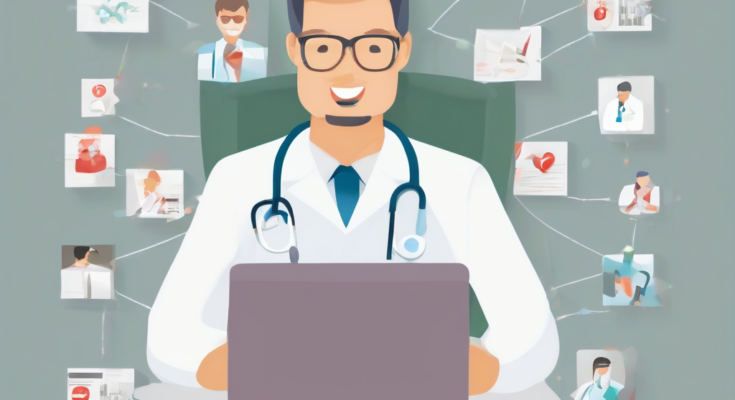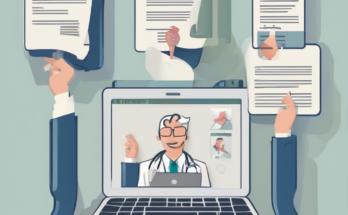Navigating the Digital Frontier: Your Guide to Online Masters in Healthcare Management
The healthcare industry is a dynamic and ever-evolving landscape, demanding leaders with both clinical expertise and strong business acumen. For professionals seeking to advance their careers without sacrificing their current commitments, an online Master’s in Healthcare Management (MHM) presents a compelling opportunity. This comprehensive guide explores the benefits, challenges, and considerations involved in pursuing an online MHM degree, helping you navigate the digital frontier and make an informed decision.
The Allure of Online Learning: Flexibility and Accessibility
One of the most significant advantages of an online MHM program is its flexibility. Unlike traditional on-campus programs, online learning allows you to study at your own pace, fitting coursework around your existing professional and personal responsibilities. This asynchronous learning model offers unparalleled convenience, particularly beneficial for working professionals, parents, or individuals with geographical constraints.
- Flexibility in Scheduling: Study anytime, anywhere, accommodating diverse schedules.
- Geographic Accessibility: Access top-tier programs regardless of location.
- Reduced Commuting Costs and Time: Eliminate travel expenses and time spent commuting.
- Technological Advancement: Leverage advanced online learning tools and resources.
Curriculum and Specializations: Tailoring Your Education
Online MHM programs typically cover a broad range of essential topics, including healthcare finance, strategic planning, operations management, healthcare policy, and legal and ethical considerations. However, the specific curriculum can vary depending on the institution and program focus. Some programs offer specialized tracks or concentrations allowing students to tailor their education to their career aspirations.
- Healthcare Finance and Accounting: Gain expertise in budgeting, cost analysis, and financial management within healthcare settings.
- Healthcare Policy and Regulation: Understand the intricacies of healthcare policy and its impact on healthcare organizations.
- Healthcare Operations Management: Master the principles of efficient and effective healthcare operations.
- Leadership and Management: Develop crucial leadership skills for managing healthcare teams and organizations.
- Data Analytics in Healthcare: Learn to use data to improve healthcare decision-making.
- Information Technology in Healthcare: Understand the role of technology in modern healthcare delivery.
Choosing the Right Online MHM Program: Key Considerations
Selecting the right online MHM program requires careful consideration of several factors. Accreditation, faculty expertise, curriculum relevance, technological support, and career services are crucial aspects to evaluate.
- Accreditation: Ensure the program is accredited by a reputable accrediting body to guarantee the quality of education and increase career prospects.
- Faculty Expertise: Research the faculty’s background, experience, and publications to ensure they possess relevant industry knowledge and expertise.
- Curriculum Relevance: Assess whether the curriculum aligns with your career goals and the current demands of the healthcare industry.
- Technological Support: Verify the program’s technological infrastructure, including learning management systems (LMS), online resources, and technical support.
- Career Services: Evaluate the program’s career services, including networking opportunities, job placement assistance, and alumni networks.
- Program Format and Structure: Consider the program’s learning modality (synchronous vs. asynchronous), program length, and course delivery method.
- Cost and Financial Aid: Research tuition fees, financial aid options, scholarships, and potential return on investment (ROI).
The Technological Landscape of Online Learning: Tools and Resources
Online MHM programs leverage a variety of technological tools and resources to enhance the learning experience. These include learning management systems (LMS), online discussion forums, virtual classrooms, video conferencing, and interactive simulations.
- Learning Management Systems (LMS): Platforms like Blackboard, Canvas, and Moodle provide access to course materials, assignments, grades, and communication tools.
- Online Discussion Forums: Foster collaborative learning and interaction among students and faculty.
- Virtual Classrooms: Offer real-time interactive sessions with instructors and classmates.
- Video Conferencing: Enables communication and collaboration through video calls.
- Interactive Simulations: Provide realistic scenarios to practice management skills in a safe environment.
Addressing Challenges and Overcoming Obstacles
While online learning offers many advantages, it also presents certain challenges. Self-discipline, time management, effective communication, and proactive engagement are crucial for success in an online MHM program.
- Self-Discipline and Time Management: Requires strong self-motivation and the ability to manage time effectively.
- Effective Communication: Successful online learning relies on clear and concise communication.
- Proactive Engagement: Active participation in online discussions and activities is essential for optimal learning.
- Technological Proficiency: Basic computer skills and familiarity with online learning technologies are necessary.
- Potential for Isolation: Strategies for building online connections and combating isolation should be considered.
Career Advancement and ROI: The Long-Term Perspective
An online MHM degree can significantly enhance your career prospects and earning potential within the healthcare industry. Graduates are well-positioned for leadership roles in hospitals, clinics, healthcare systems, and other healthcare organizations.
- Increased Earning Potential: A master’s degree often translates to higher salaries and better compensation packages.
- Career Advancement Opportunities: Provides the necessary skills and knowledge for advancement to senior management positions.
- Enhanced Job Security: Healthcare professionals with strong management skills are in high demand.
- Networking Opportunities: Online programs often offer networking opportunities with faculty, peers, and industry professionals.
- Improved Leadership Skills: Develops critical leadership skills to manage teams and organizations effectively.
Conclusion (Omitted as per instructions)


